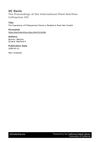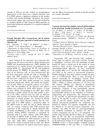Search
for
Sort by
Research
480-510 / 603 resultsresearch Development and Skin Penetration Pathway Evaluation Using Confocal Laser Scanning Microscopy of Microemulsions for Dermal Delivery Enhancement of Finasteride
Finasteride-loaded microemulsions can effectively enhance skin delivery for treating hair loss.

research Whole Blood Transcriptome Profiling Identifies Candidate Genes Associated With Alopecia in Male Giant Pandas
Researchers found genes linked to hair loss in male giant pandas.

research Exosomes for Aesthetic Dermatology: A Comprehensive Literature Review and Update
Exosomes may help with hair growth and scar healing, but more research is needed.
research The Anti-Flyaway/Frizz Effect by Inducing the Alpha-Helical Structure Transition of Hair
ATG effectively reduces hair frizz without damaging hair strength.
research Regulation of Arbuscular Mycorrhizal Fungi in Citrus Root Hairs Mediated by Auxin Efflux Carrier Protein PtPINs
AMF initially inhibits but later promotes citrus root hair growth by regulating auxin levels.

research Equine Dermatophytosis Caused by Nannizzia Gypsea - Molecular Diagnosis by qPCR
qPCR is effective for quickly diagnosing fungal infections in horses.

research Coexistence of Malassezia Species and Microsporum Canis in the Lesions of an Adult with Tinea Capitis
An adult woman with scalp infection recovered after antifungal treatment, with no return of symptoms.

research Hair Growth-Promoting Effect of the Coffee Bean Residue Extract on Hair Follicle Dermal Papilla Cells via the Activation of Autophagy
Coffee bean residue extract helps hair growth by activating cell processes.

research Current Best Evidence in Pigmentary Dermatology
Several treatments are effective for pigmentary disorders like vitiligo and melasma.

research Traditional Indian Home Remedies for Minor Ailments
Traditional Indian home remedies are effective and culturally important.

research Trichoscopic Features in Female Pattern Hair Loss: 1-Year Hospital-Based Cross-Sectional Study
Trichoscopy is an effective, noninvasive method for early diagnosis of Female Pattern Hair Loss.

research Acute Central Serous Chorioretinopathy Following Topical Minoxidil Use for Androgenic Alopecia: A Case Report
Minoxidil may cause vision problems.

research The Polyfollicular Anovulatory Androgenic Syndrome: A New Label for an Old Syndrome
Mohamed Kandil suggests renaming Polycystic Ovary Syndrome to "Polyfollicular Anovulatory Androgenic Syndrome" to better describe its symptoms, but concerns exist that it may not cover all related issues like obesity and depression.
research Flexabrasion Applied to the Evaluation of the Photodegradation of Hair Fibers

research Trichoscopy as an Essential Diagnostic Technique for Hair and Scalp Disorders in Skin of Color: A Case-Control Study
Trichoscopy is a reliable method for diagnosing hair and scalp disorders quickly and non-invasively.
research Ectopic Olfactory Receptors in Humans: New Therapeutic Possibilities
Olfactory receptors found outside the nose may offer new treatments for diseases like cancer and help in wound healing and hair growth.
research Comparative Efficacy of Injection Triamcinolone Acetonide Given Intralesionally and Through Microneedling in Alopecia Areata
Both microneedling and injections are equally effective for treating alopecia areata.

research The Expression of Phosphorus-Responsive Genes Is Related to Root Hair Growth
Certain genes may promote longer root hairs in plants when phosphorus is low.

research Indications for a Brain-Hair Follicle Axis: Inhibition of Keratinocyte Proliferation and Up-Regulation of Keratinocyte Apoptosis in Telogen Hair Follicles by Stress and Substance P
Stress can cause hair loss by negatively affecting hair follicles and this effect might be reversed with specific treatments.

research Progesterone-Induced Stimulation of Mammary Tumorigenesis Is Due to the Progesterone Metabolite, 5α-Dihydroprogesterone (5αP), and Can Be Suppressed by the 5α-Reductase Inhibitor, Finasteride
Progesterone byproduct 5αP stimulates mammary tumor growth, but finasteride can suppress it.

research New Effects of Caffeine on Corticotropin-Releasing Hormone (CRH)-Induced Stress Along the Intrafollicular Classical Hypothalamic-Pituitary-Adrenal (HPA) Axis (CRH-R1/2, IP3-R, ACTH, MC-R2) and the Neurogenic Non-HPA Axis (Substance P, p75NTR and TrkA) in Ex Vivo Human Male Androgenetic Scalp Hair Follicles
Caffeine may help reduce stress-induced hair loss.
research Substance P in Keratosis Follicularis Spinulosa Decalvans
Substance P may play a role in the inflammation seen in keratosis follicularis spinulosa decalvans.

research Probing the Effects of Stress Mediators on the Human Hair Follicle
Stress-related substance P may lead to hair loss and negatively affect hair growth.
research Determination of Estradiol and Progesterone Concentrations in Human Scalp Hair
Hair levels of estradiol and progesterone are higher in premenopausal than postmenopausal women, but the difference isn't statistically significant, indicating the need for a better measurement method.

research Effect of Carbamates on mRNA Encoding Lipid Enzymes in Hamster Flank Organs
Carbamates may help treat androgen-dependent conditions by changing how certain lipid enzymes are produced.

research Boron Deficiency Responses in Maize (Zea Mays L.) Roots
Boron deficiency in maize affects leaf boron levels and nutrient uptake differently depending on root hair presence and soil type.

research Sexually Dimorphic Effect of Progesterone and Its Reduced Metabolites on the Gene Expression of Myelin Proteins in Rat Schwann Cells
Progesterone and its metabolites affect myelin protein expression differently in male and female rat Schwann cells.

research Hair Growth Inhibition by Psychoemotional Stress: A Mouse Model for Neural Mechanisms in Hair Growth Control
Stress can stop hair growth in mice, and treatments can reverse this effect.

research Neuronal Plasticity of the Brain-Skin Connection: Stress-Triggered Up-Regulation of Neuropeptides in Dorsal Root Ganglia and Skin via Nerve Growth Factor-Dependent Pathways
Stress increases certain chemicals in the skin and nerves, which might worsen skin conditions.